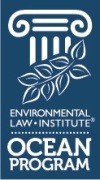About the Environmental Law Institute
 The Environmental Law Institute (ELI) is an internationally recognized independent research and education organization. Since 1969 it has served as a non-partisan source of information about environmental law, policy, and management. ELI fosters innovative, just, and practical law and policy solutions to enable leaders across borders and sectors to make environmental, economic, and social progress. The Institute does this by building the capacity of decision-makers and leaders, researching and analyzing pressing environmental challenges, bringing together diverse groups of people to build shared understanding, and disseminating information online and in print. We do not litigate or lobby.
The Environmental Law Institute (ELI) is an internationally recognized independent research and education organization. Since 1969 it has served as a non-partisan source of information about environmental law, policy, and management. ELI fosters innovative, just, and practical law and policy solutions to enable leaders across borders and sectors to make environmental, economic, and social progress. The Institute does this by building the capacity of decision-makers and leaders, researching and analyzing pressing environmental challenges, bringing together diverse groups of people to build shared understanding, and disseminating information online and in print. We do not litigate or lobby.
About ELI’s Ocean Program

The ocean acts as a critical life-support system for the planet and its people, yet human activity threatens it and the myriad services it provides. The Ocean Program strives to counter this by promoting smart and effective ocean conservation decisions and designing place-based and practical solutions.
ELI’s Ocean Program supports ocean and coastal management systems that are based on local priorities, inclusive and effective processes, and best available information. The Program focuses on supporting regional ocean management, achieving sustainable fisheries and aquaculture, and creating effective frameworks to managed ocean industry and energy. Visit the Ocean Program online to learn more about our ocean and coastal projects.
Our Work in the Arctic
Our work in the Arctic focuses on supporting and strengthening the role of Alaska Natives in offshore resource management processes. Coastal communities stand to be most affected by changes to the offshore environment and have extensive knowledge of individual resources of the ecosystem as a whole. We believe their leadership and knowledge is essential to the success of efforts to protect and sustainably use Arctic marine resources, and work to identify how relevant statutory, regulatory, and policy structures can be improved to ensure Alaska Native input is robustly incorporated into the decision-making processes.
